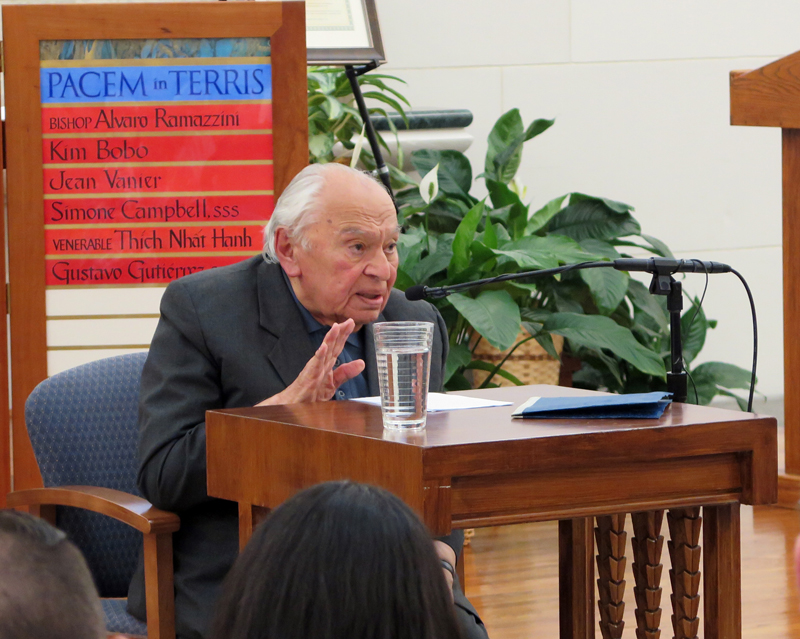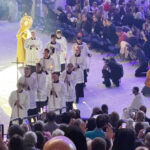By Barb Arland-Fye
The Catholic Messenger
Poverty is a contradiction to life, Father Gustavo Gutiérrez, a longtime champion of liberation theology, told an audience of 400 in Davenport where he received the Pacem in Terris Peace and Freedom Award on Sept. 28.

Father Gustavo Gutiérrez talks about friendship and poverty after receiving the Pacem in Terris Peace and Freedom Award Sept. 28. The ceremony was held in Christ the King Chapel at St. Ambrose University in Davenport.
“Indians are dying before their time … in Africa, they are dying before their time,” Fr. Gutiérrez said, pointing out that poverty around the world is taking away lives. The award he received from the interfaith Pacem in Terris Coalition is based on the encyclical of the same name, which some have described as the last will and testament of Pope John XXIII. The encyclical described all persons as equal, “created in the image of God,” the Dominican priest from Peru said during the ceremony in St. Ambrose University’s Christ the King Chapel.
Fr. Gutiérrez shared that equality begins with friendship. He cited John’s Gospel (15:12-17) in which Jesus tells his disciples, “‘I no longer call you servants because a servant does not know what his master is doing. I have called you friends, because I have told you everything I have heard from my father.’” Jesus speaks to his disciples as friends; friends are equals, the theologian noted.
He observed that friendship is an important notion in the Bible. Scripture also speaks of equality. He cited Mark’s Gospel (10: 46-52) in which the blind man, Bartimaeus, begs: “Jesus, son of David, have pity on me.” Jesus asks Bartimaeus, “What do you want me to do for you?” The question is meant to empower Bartimaeus, who answers, “I want to see.” “Go on your way; your faith has saved you,” Jesus responds. Bartimaeus contributes to his salvation, to his cure. It was not Jesus’ power alone, Fr. Gutiérrez observed.
Commitment to the poor, unity with the poor, is essential in the work toward peace and justice, the priest continued. “To be the voice of the voiceless and to help them to grow.”
The internationally known theologian, now 88, is considered the principal founder of liberation theology, which seeks to free the poor from unjust economic and social conditions. Liberation theology emphasizes the biblical conviction of a preferential option for the poor. His 1971 book “A Theology of Liberation,” is the seminal guide in this field of theology.
“You have been instrumental in helping the Christian community to read and live the Gospel from the perspective of the poor,” Bishop Martin Amos of the Davenport Diocese said as he presented the award to Fr. Gutiérrez. “You have shown your life’s commitment to reminding the world of the importance of the preferential option for the poor. You continue to set before us the suffering of the poor and challenge us to be in solidarity with the marginalized of the earth.”
Ninety minutes before the ceremony, St. Ambrose University students and their theology professors were engaged in dialogue about liberation theology and the work of Fr. Gutiérrez. They reviewed an article he had written titled “Renewing the Option for the Poor.” Fr. Gutiérrez “talks about solidarity with the poor. It’s not sympathy; it’s empathy,” said Cole Epping, a senior majoring in theology. And that’s the message he said he heard Fr. Gutiérrez deliver at the award ceremony.
“It was thrilling to see — and to have my students experience — Fr. Gustavo’s talk,” said Matthew Coomber, an associate professor of Biblical Studies at St. Ambrose University. “It’s difficult to convey the impact of his work and how it has, is, and will continue to shape the church, politics and the lives of so many. This event was a very proud day for St. Ambrose.”
Youth Minister Mike Linnenbrink, who serves parishes in Lee and Van Buren counties, brought three young men to the ceremony, about a 2-1/2-hour drive away. “I wanted these guys to have the experience of seeing someone they wouldn’t get to see every day,” Linnenbrink said. “The recipients of this award are legends in the world.”
Previous award recipients include John F. Kennedy (posthumously); Martin Luther King, Jr.; Dorothy Day; St. Teresa of Kolkata; Sister Helen Prejean, CSJ; and Lech Walesa.
Award ceremony presenters
People of diverse faiths, ages and communities participated in the Pacem in Terris Peace and Freedom Award ceremony on Sept. 28.
Christopher Clow, director of Music and Liturgy for St. Ambrose University, and a former student of Fr. Gutiérrez, provided the musical prelude. Paul Koch, provost and vice president for Academic and Student Affairs, gave the welcome. Cantor Gail P. Karp, who is Jewish, gave the opening prayer in English. Sister Phyllis Morris, OSF, gave the prayer in Spanish. The Clinton Franciscan ministers in Peru and had previously met Fr. Gutiérrez.
St. Ambrose University Professor Emeritus Father Ed Dunn gave the award’s history. Students lit candles and announced the names of the previous honorees. Father Charles Adam, chaplain and director of Campus Ministry at St. Ambrose, provided a biography of the recipient. Lisa Killinger, president of the Muslim Community of the Quad Cities, gave the closing prayer.
2016 Pacem in Terris Planning Committee and Contributors
Diocese of Davenport; St. Ambrose University; Augustana College; Churches United of the Quad Cities; The Islamic Center of the Quad Cities; The Catholic Messenger; Quad Cities Interfaith; Muslim Community of the Quad Cities; Jewish Federation of the Quad Cities; Congregation of the Humility of Mary; Sisters of St. Benedict; Sisters of St. Francis (Clinton); and Sisters of St. Francis, Dubuque.
A controversial translation
By Sister Caridad Inda, CHM
(Courtesy of A Nun’s Pocket)
In 1968 I transferred credits from St. Louis University in Missouri to American University in Washington, D.C., to start my studies for a PhD. American University did not offer advanced degrees in Spanish and Latin American literature — the areas covered by my master’s! The closest was political science with a focus on Latin America. This proved a blessing as my mentor was Dr. Brady Tyson, a friend of Dr. Martin Luther King, Jr., Andrew Young and others in the forefront of the movement for nonviolent action for liberation that energized the march on Selma and other actions.
Sister Kevin Bissell, CHM, and I were living and working together at the time and had received grants to partially cover the cost of tuition at American University but we needed additional funds. Help arrived at the hands of Dr. Tyson who, in the name of Orbis Books, was looking for someone to translate a book published in 1971 entitled “A Theology of Liberation” by Father Gustavo Gutiérrez Merino.
Fr. Gutiérrez, a peritus (expert Catholic theologian) from Peru at the Second Vatican Council, had documented a Latin American movement that became known as a theology of liberation. I was delighted to make arrangements to do the translation. Since I had a teaching fellowship in the Spanish department and was continuing to pursue doctoral studies, my time was limited. The translation process usually happened prior to my 7 a.m. Spanish class.
With time I became acquainted with the thought and style of Fr. Gutiérrez. Because the subject was sometimes intricate, I attempted to communicate with him to have him explain what he meant (If only we had the Internet then!). At one point he came to our home in Bethesda, Md., for a quick consultation. As the deadline approached, Orbis assigned John Eagleson to help prepare the indices and notes. We all knew that it was an important book. However, at the time we didn’t quite understand its importance as a seminal work that would elicit profound support from some quarters and profound rejection from others in the Vatican and around the world. The translation was published in 1973.
The controversial nature of the movement has not disappeared completely but it has facilitated other creative approaches of “doing theology.” Cardinal Gerhard Ludwig Muller, the current prefect of the Congregation of the Doctrine of the Faith, and Fr. Gutiérrez have since coauthored a book “On the Side of the Poor: The Theology of Liberation” in which they discuss their points of view. It was published in 2015.
(Sr. Caridad Inda is a member of the Congregation of the Humility of Mary in Davenport. She is the co-founder and executive director of CIRIMEX — The Center for International Resources, Inc.)











